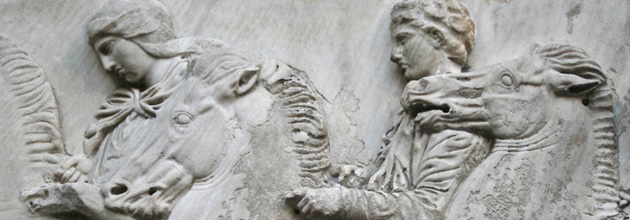
What use are the liberal arts?
A confession
Let me begin with a spectacular confession. I went straight from undergraduate school to graduate school. So when asked what one can do with a BA in classics, I have to admit that I'm not the best guy to ask (this is Dr. J talking, as usual). I didn't do anything with my BA myself, and I'm not a job counselor.
But lack of technical expertise need be no hindrance if you're a liberal arts grad. Well, that's going a bit too far, but I'll provide an answer, or rather number of partial answers, and then provide you with some links to what experts in job-hunting have to say.
What employers want (or so I've heard)
Employers are looking for a number of things when they hire: knowledge, experience, and skills are foremost among them. As a liberal arts major, you likely won't have the most important knowledge: there aren't that many jobs that require the precise knowledge base provided by a BA in philosophy, English, history, or classics.
Your major also probably won't provide you with easy access to the relevant experience, but that doesn't mean you can't get it. You may well be able to intern--if only on a volunteer basis. And you may be able to pick up extra-curricular experiences that will help.
What you will have are a set of skills that will serve you well in most jobs. You should be able to write well. You should be able to read well--that is, to understand, analyze, and critique texts, and to evaluate other forms of evidence. You should be able to think through problems and evaluate solutions to them. All of these skills will serve you well in most jobs worth having. None of these skills are monopolized by people with narrow, practical majors. And in fact practical majors sometimes inhibit the development of these skills. If all you learn is how to do things just like your professors teach you to do--rather than to think for yourself--you may not pick up the skills you'll need when your professors are no longer around.
Which of these matters the most?
Skills. Knowledge and experience will come when you get the job. The relevant knowledge for most jobs changes anyway, over time. But the skills you should gain from the liberal arts don't change, and remain relevant.
Philosophical and poetic responses
Enough practicality: two quick humane responses to this question. One a philosophical argument, but, I promise, a rather brief one. Money is a means, not an end. You don't have to have a liberal education to learn how to make money. But you do have to have a liberal education to answer questions such as whether you need, or really want, to make lots of money; whether you should spend most waking hours making money; and just how you could best spend all that money.
We all know that money can't buy everything. And it is more or less where money stops that the liberal arts begin. Poetry, for example, may seem to be just about the most useless of all things, but there have been times in my life when classical poetry, in its revelation of the nature of love, happiness, and despair, has been the most useful thing to me in the world. You can love and hate without poetry, but you can do both better with poetry.
Experts on how to make a living with the liberal arts
"Liberal Arts is Slang for Job Skills" and "Making the Liberal Arts Degree Pay off" from Ask the Headhunter, a site aimed at helping job-seekers find jobs.
"Ten Ways to Market Your Liberal Arts Degree" from Quintessential Careers, a prominent job-search site.
